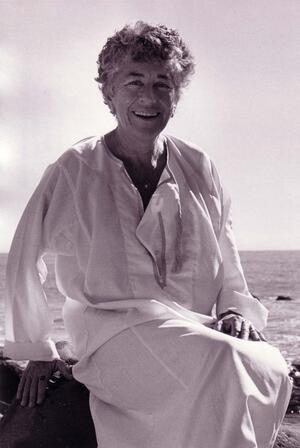Savina J. Teubal
Savina Teubal was a daughter of the conflagration that expelled Jews from the Arab world. She grew up in Argentina in what she described as a "tight-knit" and sophisticated Syrian Jewish community that celebrated learning and the preservation of tradition—for sons. Savina became her own woman as she made her way to England and then to America, applying her natural understanding of the imperative of social activism and community building to create connections in her new home. In her thirties, she began to study, and claimed as her own the Biblical legacy of her people. Her ground-breaking work, Sarah the Priestess, (first published in 1984), was Savina's first gift to the world. Her reading of the Hebrew Bible's account of the first matriarch opened hearts and minds to the power of women's stories in shaping a collective consciousness. Savina entered the Biblical world and invited each of us to follow her. Her pioneering work opened the way to teachers, rabbis, and writers across the world to create midrash [interpretation] that would enable modern readers to reconsider the biblical narratives as living stories of real women and real choices. In 1990, her readers welcomed her second book, Hagar the Egyptian. Anita Diamant might never have imagined The Red Tent without Savina Teubal's work, and thousands who have returned to Judaism were beckoned by her recasting of ancient narratives that illuminate contemporary dilemmas.
Savina's contribution to Judaism was not limited to her books, articles, and her rich works of fiction. Harnessing the power of ritual, she boldly created a ceremony for becoming an elder. Her intention and keen understanding of the interconnections of time, space, language, and sacred objects enabled her to fashion her Simchat Hochmah ["Joy of Wisdom"], a ritual that marked the transition of an individual in the context of community that itself was transformed in the process. She was partnered by a composer, a poet, and rabbis who helped her to create a ceremony that became a model for "celebrations of wisdom" across the Jewish world. Savina chose Shabbat Lech Lecha [the Sabbath on which the Torah portion about Abraham's journey is read] for her "simcha," and as she ascended to the Torah for the first time in her life, she compared her own journey to that of Sarai and Avram as they went forth to a new and unknown future. After leading her congregation in prayer, in preparation for the Torah service, Savina donned a kittel, a traditional burial shroud, to acknowledge that this celebration was also the beginning of the last chapter of her life. Many of us who joined together on that brilliant Shabbat morning in November 1986 in Los Angeles were stunned by the dissonance between Savina's vitality and this symbol of death. With clarity and strength, Savina reminded all of us of the imperative of "numbering our days." On that Shabbat morning, Debbie Friedman introduced "Lechi Lach," written with Savina, a song that encourages each of us be a source of, and an agent for blessing.
Savina reclaimed the stories of Sarah and Hagar through her writing, and through her life. Like Sarah, Savina went forth into new lands, without maps or mentors to guide her. Like Sarah and Hagar, Savina lived in a patriarchal world, challenging that world with her choices and her clarity about the work she was called to complete. The last week of Savina's life was the week in which Jews around the world read the portion VaYera, which tells of Abraham and Sarah's gracious welcome to the strangers revealed as God's messengers. Savina was one the founders of a long-standing Shabbat minyan, "Shabbat Sheni," and of the vibrant community, "Sarah's Tent." Savina's home, like Sarah's, was open to those who gathered to celebrate Shabbat, to welcome the new month, to study Torah, or to plan for the feminist transformation of the world.
May her memory be a blessing.




Savina J.Teubal seems to have been a scriptually well read Jewish woman, but seemingly not aware of Micah 52:2-3 and Isaiah 53, prophecies of the Messiah.7
I knew Savina since my pre teens, a dear friend of my mother.....always it was , a magical time of experience when we would visit Savina in the S. M. mountains of L. A . I remained mesmerized by the energy surrounding her, that she created and shared, she said to me long ago : " Make certain, you succeed at one daily focused objective, find yourself achieving one goal at a time, daily" ....I was too young to understand the human variable and great words of faith, however I am now 54 and a longing for a 'just sanctuary' is certainly a desired option now. I am a late starter my dear Savina, but your wise words and thoughts were never forgotten, I shall now , move forward accordingly, taking a glorious stand , grabbing life by the short hairs and configuring daily, a moment of achievement and praise over all my affairs, thank you and God Bless you, be safe , be well for you are always remembered and loved ! Michael DiGregorio, son of Vicki George.
She was first to explore the pre-Israel heritage of Akkadian, Sumerian, Canaanite peoples and their traditions of women priestesses, like Sarah.